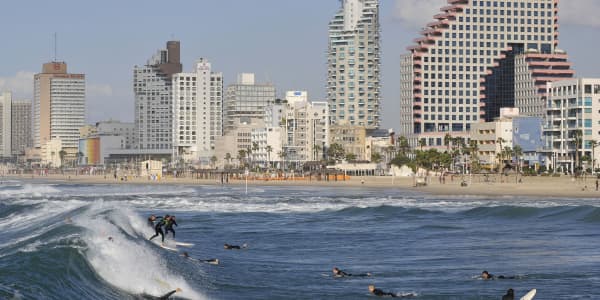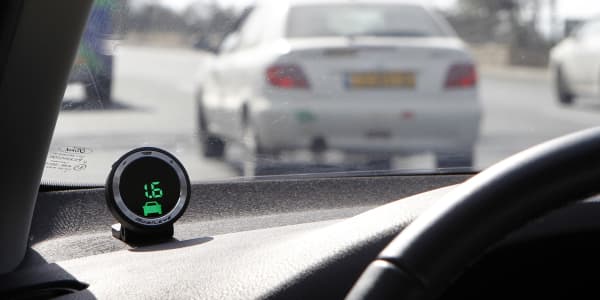Israeli-American solar power generation company Energiya Global expects to capitalize on the Trump administration's emphasis on "fighting Jihadism". Chief Executive Yosef Abramowitz in an interview with CNBC said that of his company's projected pipeline of some 1500 Megawatt of solar power in Africa over the next five years, half is in places "where the U.S. likes to counter extremist forces".
Abramowitz was fresh off a trip that took him within the space of a week from Liberia, where he accompanied visiting Israeli Prime Minister Benjamin Netanyahu, to Copenhagen, where he attended the Africa Energy Forum, an international power industry investors' meet-up. He says that he took a freshly-signed $20 million solar field deal from Liberia directly to his "debt and equity sponsors" at the forum.
The Liberia contract is part of an announcement of $1 billion in solar projects in the Economic Community of West African States, ECOWAS, area that Energiya made last weekend. Abramowitz explains that: "It is a commitment by Energiya Global to deploy $1 billion in investments over the next 4 years in ECOWAS member states through the ECOWAS energy commission."
Most of that investment is in the form of debt that is to be funded largely by international development banks and that will be underwritten by World Bank and U.S. guarantees. The projects will amount to some 500MW of mostly solar power generation with some wind and mini-hydro power mixed in as well, and come in addition to about 1000MW that exist in Energiya's current pipeline of projects in Africa.
Energiya, which is registered in Israel but has a majority of its stock held by U.S. citizens, is eminently placed to bring solar power to the African continent, says Abramowitz. He is a U.S. émigré to Israel and was involved there in setting up the Arava solar power fields before co-founding Energiya. He also was an Israeli negotiator at the Paris climate conference in 2015.
He does not expect the Trump administration's withdrawal of the U.S. from the Paris climate accord to significantly impact his company. The U.S. mechanisms that underpin his work, including OPIC, the Overseas Private Investment Corporation, and USAID's PowerAfrica program, "make money for the U.S. taxpayer," says Abramowitz.
The Paris climate deal has made a lot of money available for the kind of projects that Energiya pursues, he explains. "Most people don't realize that it wasn't only a climate deal, it was also a development deal, particularly for Africa."
The situation with solar power in developing markets post-Paris, says Abramowitz, is such that: "There is nearly unlimited debt today for these projects and the development banks are begging for a bankable deal flow. So it's a buyers' market if you know how to do this and we have a good track record."
Energiya's Israeli background and close cooperation with U.S. programs puts it in a good position to operate in Africa, says Abramowitz. The company brings unique problem-solving capabilities with it plus and understanding of the needs of the countries where it operates, from a social and economic development perspective, he says, "which is a significant differentiator with Chinese companies."
But also very significant is Israel's security mindset and experience. "We come with a unique understanding of security. Seven of the ECOWAS countries, for example, are frontline states with Islamic Jihadism. Most developers wouldn't know how to handle that, from a physical security perspective and also from a financial security one."
That is where the Trump administration comes in, Abramowitz reasons. "The emphasis of the Trump administration on fighting Jihadism means they're going to want new strategies to deploy in frontier markets, both U.S. soft power and hard power." So despite the U.S. withdrawal from the climate deal, Abramowitz says: "I think there's a renewed interest in what we're doing, not because of the climate issue but because of the anti-Jihadist agenda of the administration."
Under the project with ECOWAS, for example, Energiya is looking at The Gambia, which had declared itself an Islamic republic in 2015 and is still recovering from political unrest, instability and an ECOWAS intervention. "A normal solar developer wouldn't consider The Gambia for so many reasons but we're coming from a different place," says Abramowitz. He adds that Energiya has a "quadruple bottom line" that apart from a modest profit also features "significant humanitarian benefit, a significant environmental benefit."
Still, Energiya is a business and as such is aimed at generating returns for its investors from its solar fields. "What we're actually doing is create a new asset class. These are cash producing assets that have an insurance wrap from the World Bank or the U.S. government and that are actually very valuable, if you know how to do it and if you do it with integrity. So we anticipate that our investors will do well," says Abramowitz.
He says that while projects are often funded by development banks, Energiya is considering inviting new investors at the company ownership level: "Because we're in a growth spurt right now we're willing to take in more investors at the parent company level and that's where you get the multiples. The solar fields themselves are dependable cash flows, like annuities, but the multiples are at the holding company level. And we're open to investors whose values are consistent with ours."




